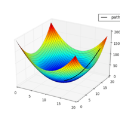Robot-assisted intervention has shown reduced radiation exposure to physicians and improved precision in clinical trials. However, existing vascular robotic systems follow master-slave control mode and entirely rely on manual commands. This paper proposes a novel offline reinforcement learning algorithm, Conservative Actor-critic with SmOoth Gradient (CASOG), to learn manipulation skills from human demonstrations on vascular robotic systems. The proposed algorithm conservatively estimates Q-function and smooths gradients of convolution layers to deal with distribution shift and overfitting issues. Furthermore, to focus on complex manipulations, transitions with larger temporal-difference error are sampled with higher probability. Comparative experiments in a pre-clinical environment demonstrate that CASOG can deliver guidewire to the target at a success rate of 94.00\% and mean backward steps of 14.07, performing closer to humans and better than prior offline reinforcement learning methods. These results indicate that the proposed algorithm is promising to improve the autonomy of vascular robotic systems.
翻译:机器人辅助手术已经显示出对医生的辐射暴露降低和在临床试验中精度提高的优点。然而,现有的血管机器人系统遵循主从控制模式并完全依赖于手动命令。本文提出了一种新的离线强化学习算法——具有平滑梯度的保守演员评论家算法(CASOG),以从血管机器人系统上的人类演示中学习操纵技能。所提出的算法保守地估计Q函数并平滑卷积层的梯度以处理分布偏移和过度拟合问题。此外,为了集中处理复杂的操纵,具有较大时差误差的转移被高概率采样。在临床前环境中进行的比较实验表明,CASOG在达到94.00%的成功率和14.07的平均反向步骤时,能够将导管输送至目标,表现更接近于人类,比以前的离线强化学习方法更好。这些结果表明,所提出的算法有望提高血管机器人系统的自主性。




